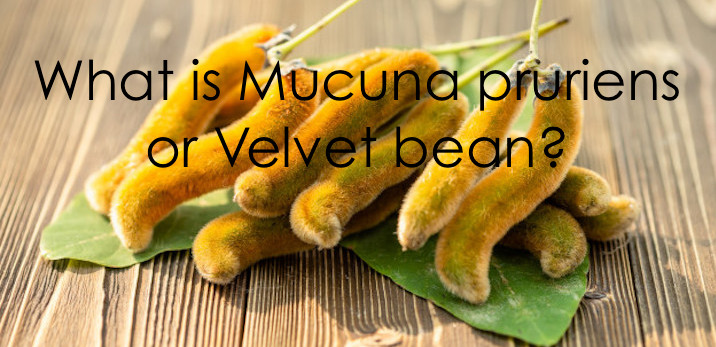Today I’m writing about Mucuna pruriens or ‘velvet bean’.
Recently, a colleague of mine mentioned it to me. As I had never heard of it before, I decided to do some research and share what I found.
What is Velvet Bean?
It is a legume that grows wild in tropical and sub tropical parts of the world. It has many other common names such as Cowhage, Cowitch, and Lacuna bean. Its botanical name is ‘Mucuna pruriens’ and it has long history as a food and a medicine.
The plant is a climber, like many species of bean or pea. It has white, lavender or purple flowers. The mature seedpods are covered in tiny hairs that cause severe itching when they come into contact with the skin. The actual seeds, or beans themselves are shiny black or brown.
The plant is popular as a fodder crop for animals in many parts of the world. It is also used to improve the soil for other crops.
What are its health benefits and uses?
The mucuna pruriens beans can be eaten as a food. The raw velvet bean seeds are rich in protein, essential fatty acids and minerals.
In many Asian countries the beans are used in the manufacture of miso and tempeh. In some countries they are roasted and used as a coffee substitute. The young seedpods can also be cooked and eaten like runner beans.
All parts of the plant, including the beans, have a history of medicinal uses.
The earliest records refer to the beans being used in Ayurvedic medicine over 2000 years ago as a diuretic and aphrodisiac. The leaves have been used for skin disorders and muscle pain. In the 1960’s research found that the beans contain a substance that has been revolutionary in the treatment of Parkinson’s disease.
In 2004, and more recently in 2017, new studies were conducted into the use of mucuna pruriens in the treatment of Parkinsons disease. These studies support the idea that mucuna pruriens is a safe alternative treatment.
The bean has also increased in popularity as a treatment for nervous disorders such as anxiety. It is also used to manage male infertility.
The velvet beans contain substances that are anti-diabetic and anti-inflammatory. They are also high in antioxidants due to the presence of L-dopa. L-Dopa is a precursor of the neurotransmitter dopamine.
Dopamine is one of the “feel good” chemicals in our brain. Interacting with the pleasure and reward center of our brain. Along with other chemicals like serotonin, oxytocin, and endorphins, dopamine plays a vital role in how happy we feel. In addition to our mood, dopamine also affects movement, memory, and focus
With this in mind, there are several health food & supplement companies producing products containing mucuna pruriens. Many of these products are recommended to assist with mood, focus and stress management.
So if anxiety or stress is hampering your life, it might benefit you to visit your local health food store to see how these velvet beans can assist you.
I personally haven’t tried any Mucuna supplements, however in light of this research, I would consider trying it.
Till the next post,
Live clean n prosper
Sources – The National Center for Biotechnology Information, Science Direct , Wikiped

